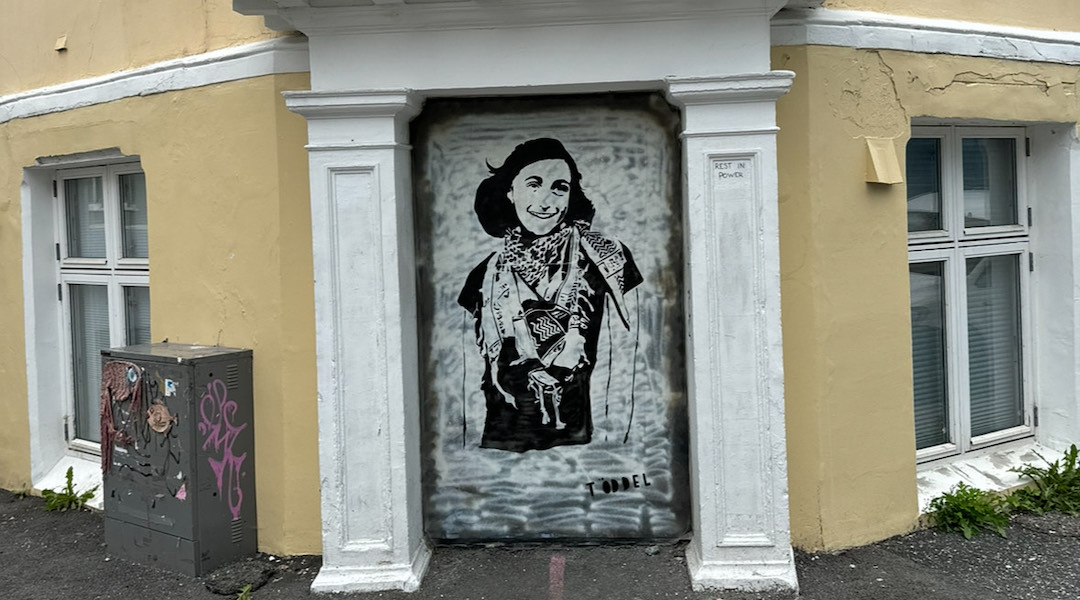When pictures of a mural in Norway depicting Anne Frank wearing a keffiyeh began circulating online this week, Jewish voices swiftly denounced it as a hateful form of anti-Israel protest.
“Depicting a Holocaust victim with a keffiyeh is a gross distortion of history,” the European Jewish Congress wrote in a statement. “Such acts are not genuine criticism but deeply antisemitic and offensive misrepresentations that undermine Holocaust memory.”
But the mural’s creator, the anonymous Norwegian street artist Töddel, is defending the work, telling the Jewish Telegraphic Agency that they chose Frank for the mural precisely because of their respect for the history of the Holocaust.
Töddel said they were not Jewish but had read Frank’s diary several times and visited the Auschwitz-Birkenau death camps with their children.
“Anne Frank is a symbol of innocence,” the artist said. “Like the children and women of Gaza, she suffered and died because of her ethnicity and religion and being in the wrong place at the wrong time.”
Titled “Death of the Innocent,” the mural went up this week in Bergen, a city on Norway’s southwest coast where two local universities recently severed ties with Israeli institutions over the war. (The city of approximately 300,000 does not have a synagogue but does have a small Jewish community that has recently started organizing events.) Töddel revealed the piece on social media on Monday, along with hashtags reading “#stoptheviolence” and “#humanitynow.”
Unlike some critics of Israel’s war in Gaza, Töddel does not view Israel as uniquely to blame for the current war. “Hamas started it all with its horrific terrorist attack,” the artist said.
But they argued that Israel’s response in Gaza — which has killed more than 39,000 people to date, according to the Hamas-run Gaza Health Ministry, and devastated the enclave — was achieving Hamas’ goal of “tarnishing the Israeli state and weakening its position in the world.”
And they said that however things started, “The killings of the innocent women and children in Gaza must stop now. I feel sure that Anne Frank … would support me in this demand.”
Töddel is far from the first to use symbols of the Holocaust to protest for Palestinians. It follows recent pro-Palestinian defacings of Anne Frank memorials in Amsterdam and Milan. The Milan memorial was an explicitly pro-Israel mural depicting Frank holding an Israeli flag, but the Amsterdam statue did not have anything to do with Israel. Pro-Palestinian protests also took place at a prominent Jewish memorial procession at Auschwitz, and at the opening of a Dutch Holocaust museum; both events included Israeli dignitaries.
Other Holocaust memorials, including in the United States, have also been targeted by activists in recent months. Pro-Palestinian demonstrators globally have called Israel’s military campaign in Gaza a genocide, a charge Israel vehemently denies. Some have invoked the Holocaust in those protests.
Töddel’s mural is located blocks from the University of Bergen, which in December severed ties with an Israeli institution, the Bezalel Art Academy in Jerusalem, over the war (as did another local university, the Bergen School of Architecture). While the school’s dean insisted at the time that the move was not a boycott, the global Boycott, Divestment, Sanctions movement would later trumpet Bergen’s move alongside three other Norwegian universities that also cut ties with Israeli schools.
Norway also became one of a handful of European countries to formally recognize a state of Palestine in May; relations between Norway and Israel have swiftly deteriorated since then, with Israel recently denying a state visit request and criticizing Norway for accusing the military of violating international humanitarian law.
Correction (July 28): This story has been corrected to show that Bergen, Norway, does have an organized Jewish community.
JTA has documented Jewish history in real-time for over a century. Keep our journalism strong by joining us in supporting independent, award-winning reporting.






